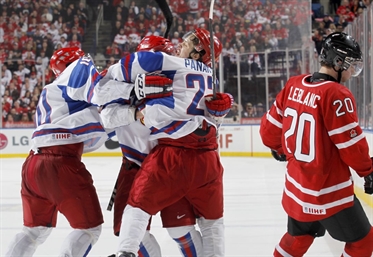Here's to the future
Here's to the future
Whose dreams will come true in Helsinki?

 Artemi Panarin's gold medal heroics for Russia in 2011 catapulted him into the spotlight for the first time. Photo: Andre Ringuette / HHOF-IIHF Images
Artemi Panarin's gold medal heroics for Russia in 2011 catapulted him into the spotlight for the first time. Photo: Andre Ringuette / HHOF-IIHF Images
Every U20 player here in Helsinki over the holidays dreams of parlaying a successful tournament into a glittering, long-lasting pro and international career. Yet those dreams will only come true for a select handful.
Both wins and losses loom larger for teenagers, and cheers and tears escape them more readily. Canada’s Jordan Eberle may never score a bigger or more exhilarating goal than his tying marker versus Russia in the 2009 semi-final in Ottawa with 5.4 seconds left. The victims on that play, Russian goalie Vadim Zhelobnyuk and defenceman Dmitri Kulikov, will never forget where they were either.
Remember what happened to Canadian netminder Marc-Andre Fleury, whose own goal off teammate Braydon Coburn gave the Americans the joy of their first-ever WJC title in 2004 in Helsinki.
And while the Finns whooped it up after Rasmus Ristolainen’s overtime goal downed archrival Sweden 3-2 in the 2014 final in Malmo, you couldn’t help feeling for 19-year-old Swedish captain Filip Forsberg, classy but anguished as he spoke to reporters afterwards.
Unlike the Olympics, the IIHF Ice Hockey World Championship, or the NHL, opportunities to win at the World Juniors are limited. No player has participated in more than four tourneys, and only Canada’s Jason Botterill has earned three gold medals (1994-96).
So whether you're a big name like the U.S.’s Auston Matthews or Sweden’s William Nylander, or the 13th forward on newly promoted Belarus, the message is clear: savor every moment. Not everyone goes on to be Peter Forsberg, Jonathan Toews, or Alexander Ovechkin on bigger stages. You may never find yourself in a better position.
Even in the YouTube era, the World Juniors offer a platform for less-hyped players to explode into the hockey-watching public’s consciousness. Think of Artemi Panarin – now a Calder Trophy candidate with Chicago, but never drafted by an NHL team – scoring two spectacular third-period goals in Russia’s insane 5-3 comeback win over Canada in the 2011 gold medal game in Buffalo.
The hockey is imperfect, and it is captivating for that very reason. Think back to the best three-game series ever in international hockey: the 1987 Canada Cup final between Canada and the Soviet Union. Pitting Wayne Gretzky and Mario Lemieux at their peak against the famous KLM Line, every game finished 6-5. It was not careful, calculated hockey. It was run-and-gun at its finest.
That’s often what we get at the World Juniors, too, as the delightful onset of teenage panic undoes the best-laid defensive strategies of coaches.
For a fresh example, look no further than Canada’s 7-6 exhibition win over Sweden, in which the Swedes rallied from a 6-2 deficit to tie it up. It evoked Russia’s near-comeback against the Canadians in last year’s gold medal game, a 5-4 win for the hosts.
Thrilling, full-tilt, unpredictable hockey is the norm at the World Juniors. It’s no wonder TSN now televises each and every game, and other networks are ramping up their coverage.
But while the tournament’s reach and popularity grows every year, the quality of the play isn’t a new phenomenon. Ask any Canadian kid who used to get up at the crack of dawn to watch Canada take on the Soviet Union in the 1980’s.
Of course, the World Juniors have long ceased to be merely a coronation for Canada or the Russians. There are at least five bona fide gold medal contenders this year. And as the Czech and Slovak programs continue to reload and Switzerland and Denmark develop deeper talent pools, there could be even more candidates for the top prize.
Here’s to the future. And the future is now.
Welcome to the 2016 IIHF World Junior Championship.
Back to Overview
















































